 |
In this issue:
Events
Keep Up
Pass it on
Know anyone who might be interested in our newsletter? Click here
to subscribe.
tel: (949) 824-2284
fax: (949) 824-2285
email: imtfi@uci.edu
|
|
 |
Message
from the director, Bill Maurer
 In this Spring 2013 issue of the Institute for Money, Technology & Financial Inclusion’s (IMTFI) Electronic Newsletter, we highlight recent
developments from our network of over 100 researchers in 35 countries. IMTFI continues to support important and original research into people’s everyday
financial practices and on the adoption and use of new technologies for money savings and transfer. In this issue we summarize results from our Fourth Annual
Conference and spotlight a variety of public engagements and projects with industry partners – from recent publications on designing mobile money services in
Afghanistan and China to the IMTFI-sponsored conference "Reaching the Unreached: Mobile Money Uptake in Ghana." We also showcase recent reports on
IMTFI-funded research, as well as artifacts from the history of payment and money collected by IMTFI researchers on display at UC Irvine and the British
Museum. In this Spring 2013 issue of the Institute for Money, Technology & Financial Inclusion’s (IMTFI) Electronic Newsletter, we highlight recent
developments from our network of over 100 researchers in 35 countries. IMTFI continues to support important and original research into people’s everyday
financial practices and on the adoption and use of new technologies for money savings and transfer. In this issue we summarize results from our Fourth Annual
Conference and spotlight a variety of public engagements and projects with industry partners – from recent publications on designing mobile money services in
Afghanistan and China to the IMTFI-sponsored conference "Reaching the Unreached: Mobile Money Uptake in Ghana." We also showcase recent reports on
IMTFI-funded research, as well as artifacts from the history of payment and money collected by IMTFI researchers on display at UC Irvine and the British
Museum.
We have been distilling lessons learned from our ever-growing portfolio of original case studies of mobile money and everyday financial lives of the poor, and
will soon be releasing a report on the perennial question: What drives people to use a mobile money service, and what prevents them from doing so? With an
impressive and growing global footprint – constituted not only by researchers who often live and work where they conduct their investigations, but also by
connections to academic, industry, and regulatory networks – IMTFI brings together diverse perspectives to shape the conversation about the potential of
mobile money in the developing world, and beyond.
To read the first issue of the IMTFI newsletter, see
here.
FEATURED NEWS
IMTFI’s 4th annual conference
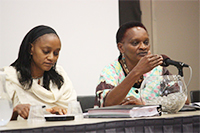
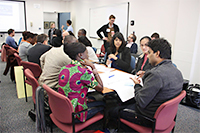
IMTFI fellows and funded researchers came together in December 2012 in Irvine, California to present work-in-progress and to think through new
collaborations at IMTFI’s fourth annual conference. As more professionals in philanthropic, industry and development domains ask how mobile technology
can expand access to needed financial services, IMTFI researchers look to the on-the-ground experience of mobile money users, businesspeople, and regulators
for insight.
Conference participants discussed cutting-edge research on topics ranging from designing mobile money services for the blind in Kenya (see YouTube video) and mobile money initiatives with cash transfer programs
in Brazil and Indonesia, to the diverse denominational practices of merchants in open-air Ethiopian marketplaces, and the potential payment platform provided
by electronic betting games in Colombia. Much discussion at the conference focused on connections between practices and objects: researchers described diverse
and changing worlds in which money remains both material and dematerialized, digitized, spectral. Participants thoughtfully engaged with, as blogger and IMTFI
affiliate Liz Losh puts it, "real people’s practices around objects, not just the objects themselves, such as forms of money or the technologies for
storage or transfer. They asked, for instance, ‘Is dematerialization really new, and is that really what we’re seeing when we look at digital money
forms today?’"
For a summary of the conference presentations, see the series of blog posts by Liz Losh, who recounts the very stimulating few days in detail (see them online
here, or download a pdf here). Video from the conference is also online, as are
researchers’ powerpoint presentations.
IMTFI money artifacts on display at UC Irvine and the British Museum
 Select artifacts and resources from IMTFI’s collection of money objects and paraphernalia are on display at UC Irvine’s Langson Library. The
exhibit, titled "Gold to Gigabytes: The Past, Present and Future of
Money," explores the history and anthropology of money, tracing the evolution of currency from ancient beginnings to its diverse manifestations today
while broadly illuminating new trends in forms of payment and alternative currencies. Featuring a diverse array of artifacts – from African valuables to early
payment technologies to money films, games, and art – the exhibit also treats the rise of credit cards and cashless transactions, the development of digital
currencies like Bitcoin, and the creation of new technologies for electronic payment and banking.
Select artifacts and resources from IMTFI’s collection of money objects and paraphernalia are on display at UC Irvine’s Langson Library. The
exhibit, titled "Gold to Gigabytes: The Past, Present and Future of
Money," explores the history and anthropology of money, tracing the evolution of currency from ancient beginnings to its diverse manifestations today
while broadly illuminating new trends in forms of payment and alternative currencies. Featuring a diverse array of artifacts – from African valuables to early
payment technologies to money films, games, and art – the exhibit also treats the rise of credit cards and cashless transactions, the development of digital
currencies like Bitcoin, and the creation of new technologies for electronic payment and banking.
The exhibit was inaugurated at a lecture and public reception with Catherine Eagleton, the Curator of Modern Money at the British Museum, and IMTFI Director
Bill Maurer on October 5, 2012. The exhibit is curated by UCI Libraries and IMTFI staff and is on display through April 2013 in the Langson Library Muriel
Ansley Reynolds Gallery during regular library hours.
"Gold to Gigabytes" was also documented by REAL ORANGE on PBS SoCal. The show features an interview with Maurer and footage from the collections.
Visit here to view the segment on PBS SoCal.
In the previous newsletter, we described the participation of IMTFI in the creation of the British Museum’s Citi Money Gallery, which includes artifacts donated by
IMTFI researchers. Visitors to the British Museum’s website can now search for all of the money and payment objects contributed to the British Museum
through IMTFI. Just search “IMTFI” in the British Museum’s online collection
database (or click
here).
WORKING PAPERS AND RESEARCH
Social networks of mobile money in Kenya
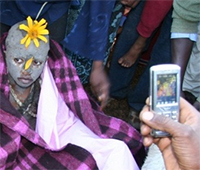 In IMTFI’s latest working paper, Sibel Kusimba, Harpieth Chaggar,
Elizabeth Gross, and Gabriel Kunya report on the complex social and economic networks produced and revealed by mobile money in Western Kenya. Although mobile
money services are often described as a form of "banking," most users in Western Kenya use mobile money as a social and economic tool through which
they create relationships by sending money and airtime gifts. A wide range of mobile money uses includes social gifting, assisting friends and relatives,
organizing savings groups, and contributing to ceremonies and rituals. Even though mobile money was designed for person-to-person transfers, the authors argue
that its practices are best understood as created by collectivities and groups. Matrilineal kinship ties are a means of sharing or circulating money among
those marginalized from access to other resources and forms of value. For Kusimba and team’s working paper, see here (.pdf).
In IMTFI’s latest working paper, Sibel Kusimba, Harpieth Chaggar,
Elizabeth Gross, and Gabriel Kunya report on the complex social and economic networks produced and revealed by mobile money in Western Kenya. Although mobile
money services are often described as a form of "banking," most users in Western Kenya use mobile money as a social and economic tool through which
they create relationships by sending money and airtime gifts. A wide range of mobile money uses includes social gifting, assisting friends and relatives,
organizing savings groups, and contributing to ceremonies and rituals. Even though mobile money was designed for person-to-person transfers, the authors argue
that its practices are best understood as created by collectivities and groups. Matrilineal kinship ties are a means of sharing or circulating money among
those marginalized from access to other resources and forms of value. For Kusimba and team’s working paper, see here (.pdf).
IMTFI-supported research and guest contributions on the IMTFI blog
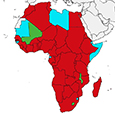 IMTFI fellows and affiliated researchers have also contributed in recent months to the IMTFI blog with
updates from their ongoing research projects. Kevin Donovan writes about SIM registration and financial inclusion in Kenya. Donovan asks whether new SIM registration regulation might do more harm
than good to financial inclusion efforts in Kenya and other parts of Africa.
IMTFI fellows and affiliated researchers have also contributed in recent months to the IMTFI blog with
updates from their ongoing research projects. Kevin Donovan writes about SIM registration and financial inclusion in Kenya. Donovan asks whether new SIM registration regulation might do more harm
than good to financial inclusion efforts in Kenya and other parts of Africa.
 Joel Patenaude reports on IMTFI-supported research
in the Greater Ibadan Lagos Accra (GILA) corridor on cross-border monetary practices and mobile money adoption. Patenaude notes the persistence of cash
transactions in a region with diverse regulatory environments and payment systems. He outlines the different regulatory landscapes and proposes various steps
that governments and industry might take to enable an intra-regional mobile money service that would facilitate the existing cross-border trade environment.
Joel Patenaude reports on IMTFI-supported research
in the Greater Ibadan Lagos Accra (GILA) corridor on cross-border monetary practices and mobile money adoption. Patenaude notes the persistence of cash
transactions in a region with diverse regulatory environments and payment systems. He outlines the different regulatory landscapes and proposes various steps
that governments and industry might take to enable an intra-regional mobile money service that would facilitate the existing cross-border trade environment.
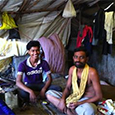 Also reporting on IMTFI-supported research, Deepti Kc describes the variety of difficulties she and her colleagues faced in working with migrant rickshaw pullers in Delhi, India as they
registered for identification cards and mobile money services.
Also reporting on IMTFI-supported research, Deepti Kc describes the variety of difficulties she and her colleagues faced in working with migrant rickshaw pullers in Delhi, India as they
registered for identification cards and mobile money services.
 Finally, Ignacio Mas and his colleagues have contributed several recent guest posts, from reflections on M-Shwari in Kenya to thoughts on the metaphors we use to describe money and the importance of situational thinking in accounting for people’s everyday
financial decision-making.
Finally, Ignacio Mas and his colleagues have contributed several recent guest posts, from reflections on M-Shwari in Kenya to thoughts on the metaphors we use to describe money and the importance of situational thinking in accounting for people’s everyday
financial decision-making.
COLLABORATIVE PROJECTS AND PUBLIC ENGAGEMENTS
IMTFI supports conference on mobile payments in Ghana
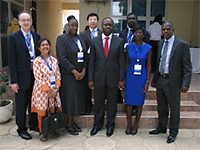 IMTFI fellows Edwin Clifford Mensah and Zhixin "Richard" Kang (along with IMTFI researchers Abena Offe and Yaw Owusu-Agyeman) at the Ghana Technology
University College (GTUC), Accra, recently organized the conference "Reaching the Unreached: Mobile Uptake in Ghana." The conference brought together
a diverse group of researchers, industry experts from mobile money providers and telecommunications companies, regulators and policymakers, community leaders
and organizers, and mobile money users and customers. It featured paper presentations, panel discussions, and onsite mobile money demonstrations. The
conference included remarks by the Ghanaian Minister of Communications and the Vice-President of GTUC, and a keynote address by Peter Zetterli of the
Consultative Group to Assist the Poor (CGAP). Mobile money use has lagged behind in Ghana, especially in comparison to success stories such as M-Pesa in Kenya.
The conference aimed to explore, in particular, the contributions of retail agents to mobile money uptake and existing and potential barriers to adoption,
while promising to open a space of discussion among diverse stakeholders. The conference booklet and agenda can be found here (pdf).
IMTFI fellows Edwin Clifford Mensah and Zhixin "Richard" Kang (along with IMTFI researchers Abena Offe and Yaw Owusu-Agyeman) at the Ghana Technology
University College (GTUC), Accra, recently organized the conference "Reaching the Unreached: Mobile Uptake in Ghana." The conference brought together
a diverse group of researchers, industry experts from mobile money providers and telecommunications companies, regulators and policymakers, community leaders
and organizers, and mobile money users and customers. It featured paper presentations, panel discussions, and onsite mobile money demonstrations. The
conference included remarks by the Ghanaian Minister of Communications and the Vice-President of GTUC, and a keynote address by Peter Zetterli of the
Consultative Group to Assist the Poor (CGAP). Mobile money use has lagged behind in Ghana, especially in comparison to success stories such as M-Pesa in Kenya.
The conference aimed to explore, in particular, the contributions of retail agents to mobile money uptake and existing and potential barriers to adoption,
while promising to open a space of discussion among diverse stakeholders. The conference booklet and agenda can be found here (pdf).
Mensah and Kang also reflect on the motivation and results of the event on the IMTFI blog (here and here).
DESIGNS FOR BETTER FINANCIAL SERVICES
IMTFI’s industry partners frog design and Reboot have recently published results of research in Afghanistan and China, respectively.
Risk and savings in Afghanistan
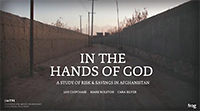 A team from the design firm frog (Jan Chipchase, Mark Rolston, Cara Silver) and University of
Washington’s Joshua Blumenstock traveled to Afghanistan December 2012 to investigate people’s savings practices and perceptions of risk and reward.
Researchers found that "actively mitigating financial risk was a very real part of everyday life" in Afghanistan. Having encountered widespread
laments about the high-risk nature of everyday financial transactions and repeated demands for more trusted financial services, in their report, researchers
suggest rethinking existing savings platforms and products. Based on their deep ethnographic engagements with people on the ground, frog researchers proposed
that new designs for financial services in Afghanistan should take into account rewards and incentives, family entanglements, Islamic rules governing financial
practice, and the "culture of contribution" that often structures earning, spending, and saving. The methods, results, conclusions, and preliminary
commentary on implications of this collaboration can be found in the frog publication "In the Hands of God."
A team from the design firm frog (Jan Chipchase, Mark Rolston, Cara Silver) and University of
Washington’s Joshua Blumenstock traveled to Afghanistan December 2012 to investigate people’s savings practices and perceptions of risk and reward.
Researchers found that "actively mitigating financial risk was a very real part of everyday life" in Afghanistan. Having encountered widespread
laments about the high-risk nature of everyday financial transactions and repeated demands for more trusted financial services, in their report, researchers
suggest rethinking existing savings platforms and products. Based on their deep ethnographic engagements with people on the ground, frog researchers proposed
that new designs for financial services in Afghanistan should take into account rewards and incentives, family entanglements, Islamic rules governing financial
practice, and the "culture of contribution" that often structures earning, spending, and saving. The methods, results, conclusions, and preliminary
commentary on implications of this collaboration can be found in the frog publication "In the Hands of God."
Financial services for the migrant poor in China
 IMTFI-supported field research in China by former IMTFI fellow and Reboot Principal Panthea Lee co-written with Patrick Ainslie and Sarah Fathallah. "Embracing Informality: Designing Financial Services for
China’s Marginalized" documents the variety of needs and experiences of urban migrants, rural villagers, and ethnic minorities with regard to
existing financial services and potential mobile money systems. The Reboot team emphasizes that service providers should seek to build on existing informal
practices, leverage existing social relations, focus empathetically on the needs people express, especially for stability. Writing on the IMTFI blog about
"Embracing Informality"’s launch party in New York, IMTFI post-doctoral scholar Ivan Small summarizes the Reboot project, emphasizing the
”importance of engaging ethnographic design for effective development.”
IMTFI-supported field research in China by former IMTFI fellow and Reboot Principal Panthea Lee co-written with Patrick Ainslie and Sarah Fathallah. "Embracing Informality: Designing Financial Services for
China’s Marginalized" documents the variety of needs and experiences of urban migrants, rural villagers, and ethnic minorities with regard to
existing financial services and potential mobile money systems. The Reboot team emphasizes that service providers should seek to build on existing informal
practices, leverage existing social relations, focus empathetically on the needs people express, especially for stability. Writing on the IMTFI blog about
"Embracing Informality"’s launch party in New York, IMTFI post-doctoral scholar Ivan Small summarizes the Reboot project, emphasizing the
”importance of engaging ethnographic design for effective development.”
Both the frog and Reboot projects have gained significant publicity. For a brief roundup of Reboot’s impacts, see the blogpost here. For frog, see here.
COMING SOON
Be sure to check back regularly, as announcements of the latest cohort of IMTFI-funded research projects will be released soon!
|
 |

 In this Spring 2013 issue of the Institute for Money, Technology & Financial Inclusion’s (IMTFI) Electronic Newsletter, we highlight recent
developments from our network of over 100 researchers in 35 countries. IMTFI continues to support important and original research into people’s everyday
financial practices and on the adoption and use of new technologies for money savings and transfer. In this issue we summarize results from our Fourth Annual
Conference and spotlight a variety of public engagements and projects with industry partners – from recent publications on designing mobile money services in
Afghanistan and China to the IMTFI-sponsored conference "Reaching the Unreached: Mobile Money Uptake in Ghana." We also showcase recent reports on
IMTFI-funded research, as well as artifacts from the history of payment and money collected by IMTFI researchers on display at UC Irvine and the British
Museum.
In this Spring 2013 issue of the Institute for Money, Technology & Financial Inclusion’s (IMTFI) Electronic Newsletter, we highlight recent
developments from our network of over 100 researchers in 35 countries. IMTFI continues to support important and original research into people’s everyday
financial practices and on the adoption and use of new technologies for money savings and transfer. In this issue we summarize results from our Fourth Annual
Conference and spotlight a variety of public engagements and projects with industry partners – from recent publications on designing mobile money services in
Afghanistan and China to the IMTFI-sponsored conference "Reaching the Unreached: Mobile Money Uptake in Ghana." We also showcase recent reports on
IMTFI-funded research, as well as artifacts from the history of payment and money collected by IMTFI researchers on display at UC Irvine and the British
Museum.

 Select artifacts and resources from IMTFI’s collection of money objects and paraphernalia are on display at UC Irvine’s Langson Library. The
exhibit, titled
Select artifacts and resources from IMTFI’s collection of money objects and paraphernalia are on display at UC Irvine’s Langson Library. The
exhibit, titled  In IMTFI’s
In IMTFI’s  IMTFI fellows and affiliated researchers have also contributed in recent months to the
IMTFI fellows and affiliated researchers have also contributed in recent months to the  Joel Patenaude
Joel Patenaude  Also reporting on IMTFI-supported research, Deepti Kc
Also reporting on IMTFI-supported research, Deepti Kc  Finally, Ignacio Mas and his colleagues have contributed several recent guest posts, from
Finally, Ignacio Mas and his colleagues have contributed several recent guest posts, from  IMTFI fellows Edwin Clifford Mensah and Zhixin "Richard" Kang (along with IMTFI researchers Abena Offe and Yaw Owusu-Agyeman) at the Ghana Technology
University College (GTUC), Accra, recently organized the conference "Reaching the Unreached: Mobile Uptake in Ghana." The conference brought together
a diverse group of researchers, industry experts from mobile money providers and telecommunications companies, regulators and policymakers, community leaders
and organizers, and mobile money users and customers. It featured paper presentations, panel discussions, and onsite mobile money demonstrations. The
conference included remarks by the Ghanaian Minister of Communications and the Vice-President of GTUC, and a keynote address by Peter Zetterli of the
Consultative Group to Assist the Poor (CGAP). Mobile money use has lagged behind in Ghana, especially in comparison to success stories such as M-Pesa in Kenya.
The conference aimed to explore, in particular, the contributions of retail agents to mobile money uptake and existing and potential barriers to adoption,
while promising to open a space of discussion among diverse stakeholders. The conference booklet and agenda can be found
IMTFI fellows Edwin Clifford Mensah and Zhixin "Richard" Kang (along with IMTFI researchers Abena Offe and Yaw Owusu-Agyeman) at the Ghana Technology
University College (GTUC), Accra, recently organized the conference "Reaching the Unreached: Mobile Uptake in Ghana." The conference brought together
a diverse group of researchers, industry experts from mobile money providers and telecommunications companies, regulators and policymakers, community leaders
and organizers, and mobile money users and customers. It featured paper presentations, panel discussions, and onsite mobile money demonstrations. The
conference included remarks by the Ghanaian Minister of Communications and the Vice-President of GTUC, and a keynote address by Peter Zetterli of the
Consultative Group to Assist the Poor (CGAP). Mobile money use has lagged behind in Ghana, especially in comparison to success stories such as M-Pesa in Kenya.
The conference aimed to explore, in particular, the contributions of retail agents to mobile money uptake and existing and potential barriers to adoption,
while promising to open a space of discussion among diverse stakeholders. The conference booklet and agenda can be found  A team from the design firm
A team from the design firm  IMTFI-supported field research in China by former IMTFI fellow and Reboot Principal Panthea Lee co-written with Patrick Ainslie and Sarah Fathallah.
IMTFI-supported field research in China by former IMTFI fellow and Reboot Principal Panthea Lee co-written with Patrick Ainslie and Sarah Fathallah.